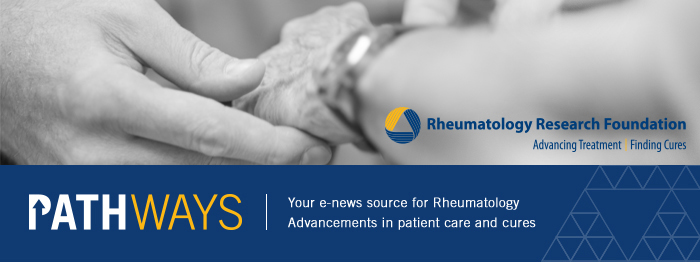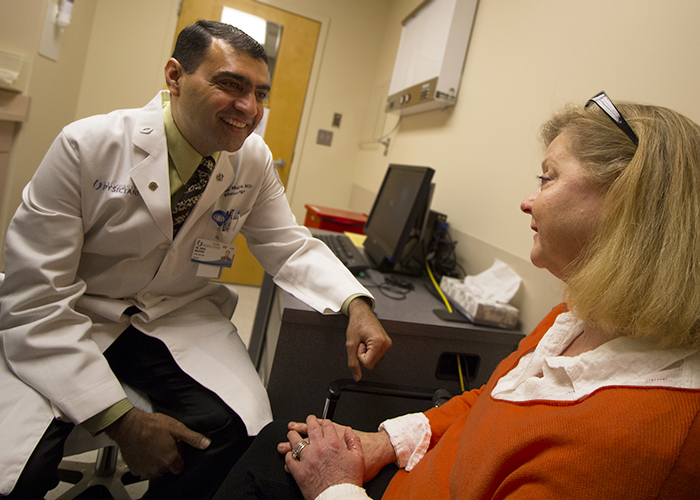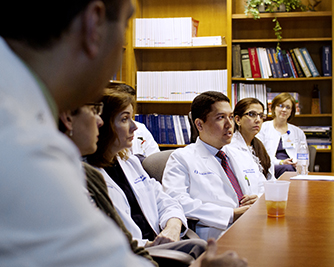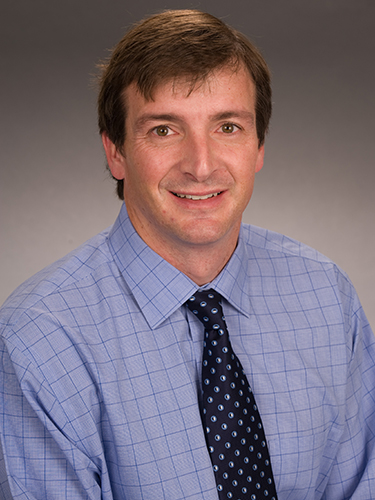Pathways

Volume 4 • Issue 5 • May 2015 • Rheumatology Research Foundation
Meeting the Needs of Patients Through Training

Vikas Majithia, MD, MPH, chats with a patient.
|
As the rheumatology fellowship program director at the University of Mississippi Medical Center in Jackson, Mississippi, Vikas Majithia, MD, MPH, trains the next generation of rheumatologists. With the help of funding from the Rheumatology Research Foundation, he has not only expanded the training spots for rheumatology fellows at his institution, he also provides patients with more experienced rheumatologists.

Dr. Majithia meets with rheumatologists-in-training who are referred to as fellows.
|
Dr. Majithia has received the Foundation’s Amgen Fellowship Training Award four times since 2010. The award provides funding to an institution to support the salary of a rheumatologist-in-training. The goal is to ensure a more robust and highly-trained workforce is available to provide clinical care to people with rheumatic diseases. Dr. Majithia says receiving the award has been very beneficial for his program, especially during a time when medical funding across the country is limited. “This award has been a great anchor to us to ensure that we fulfill our commitment to the fellowship,” he explains. “Obtaining the award over the years has provided us with significant financial security to continue to provide training.” During Dr. Majithia’s time at the University of Mississippi, the rheumatology fellowship training program has gone from one new fellow per year to two.
Dr. Majithia notes, “The investments that the Foundation makes into rheumatology programs directly impact patient lives by increasing the number of people who are available to take care of those patients.” Some people in need of treatment are already seeing the result s of Dr. Majithia’s work and Foundation awards. A former trainee, Kirk Eddleman, MD, is currently practicing in Oxford, Mississippi, fulfilling a decade-long, unmet need for rheumatology care in rural central Mississippi. Similarly, Janie Bruce, MD, is treating patients in South Carolina, a state identified by the Foundation as an area where many patients in need of rheumatology services do not have access to rheumatologists.
According to Dr. Majithia, the Foundation’s Amgen Fellowship Training Award has become a valuable tool for providing valuable education for future rheumatologists who will be more equipped to treat the growing patient population. He believes the award will help his university expand the training they offer even further, helping to meet the needs of people with rheumatic diseases across the country.
This year marks the 30th anniversary of the Rheumatology Research Foundation! To celebrate 30 years of advancing treatment of rheumatic diseases, the Foundation will profile 30 people who have made a significant impact in the world of rheumatology through their work with the Foundation. Please feel free to email us if you would like to contribute a story about how the work of the Foundation has directly impacted your life, or if you would love an opportunity to share your story or brag about your rheumatologist. We would love to hear from you!
30 Over 30: William Robinson, MD, PhD

William Robinson, MD, PhD
|
William Robinson, MD, PhD, first became interested in rheumatology in medical school when he started working with a rheumatologist, as well as several other rheumatology mentors. After completing his residency, he joined the rheumatology fellowship program at Stanford University Medical Center where he earned support for his research from the Rheumatology Research Foundation. A Career Development Award and a small grant from the Foundation propelled his career and allowed him to investigate rheumatic diseases. Now an Associate Professor at Stanford University, he has his own lab where he has used further Foundation funding to conduct innovative research and train future rheumatology investigators. Dr. Robinson reflects on how the Foundation has made a huge impact on his career and the outcomes of his work by enabling him to go into research and thrive.
Q: How did you first hear about the Foundation’s grant opportunities?
A: I was a young rheumatology fellow at the time and was trying to find funding. There were very, very few options. At a certain point in one’s career, you need the validation that comes with funding from the National Institutes of Health (NIH). The Foundation fills the gaps in NIH funding and is a catalyst that enables young rheumatologists and trainees to advance their research to the point where they can eventually receive that NIH award.
Q: What did receiving a grant mean to you and your career?
A: Receiving a grant gave me scientific and academic recognition. The Foundation has a rigorous scientific peer-review process and provides vital funding. Without it, I would not have been able to pay for salaries and the supplies necessary for my research.
Q: What is the greatest impact you’ve seen the Foundation make in the last 30 years?
A: It has had a huge impact at multiple levels. First, the Foundation has supported trainees and infrastructure for training in teaching and clinical programs. Second, they have provided a series of awards that assist fellows in becoming faculty members.
Q: What do you hope to see the Foundation achieve over the next 30 years?
A: There will be opportunities and challenges in the next 30 years. One of the challenges is the shortage of clinical rheumatologists, so the Foundation needs to continue helping expand the workforce even more than they are now. They need to create more physicians and physician-scientists. In addition, the fiscal environment is changing. In the past, NIH grants were not as competitive as they are today. Now we need to create a funding stream to support the research and careers of investigators in the field of rheumatology.
Q: What do you wish people knew about the Foundation?
A: The Foundation is well known in the field. However, greater exposure among patients and families would further increase awareness. They also need to get the word out about their work, so others can see and appreciate the impact the Foundation is having.
Q: How does the Foundation contribute to a strong and capable workforce?
A: The Foundation contributes to the whole spectrum—they support not only fellows, but also medical students and residents to expose young people in training to the field. They show young trainees opportunities in rheumatology and then continue supporting them once they’ve made the decision to pursue rheumatology. Essentially, the Foundation promotes and supports learning and training in rheumatology.